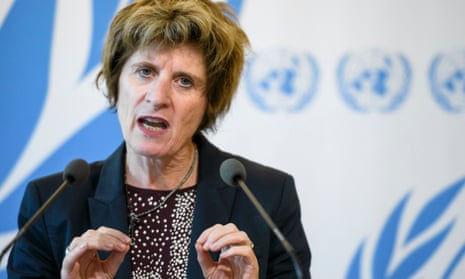The US policy on abortion is a form of extremist hate that amounts to the torture of women, the UN deputy high commissioner for human rights told the Guardian.
The attack on women’s rights was a “crisis”, organised and well-resourced by very extremist groups.
“We have not called it out in the same way we have other forms of extremist hate, but this is gender-based violence against women, no question,” Kate Gilmore said.
“It’s clear it’s torture – it’s a deprivation of a right to health,” she warned, pointing out that the committee of experts assigned to monitor the implementation of the nine core UN human rights instruments have each “independently declared the absolute prohibition of abortion … is against human rights”.
Gilmore, appointed deputy high commissioner in 2015, said the banning of abortion in some US states and the attempts by the Trump administration to remove language from key international documents was “deeply distressing”.
“This is a crisis. It’s a crisis directed at women,” she said, warning that we had not yet felt the full extent of it.
Gilmore, who last week spoke at a Guardian event discussing the pushback on reproductive rights, said opposition groups – the most high profile of which are conservative, Christian organisations – were well organised and well resourced, and were ignoring evidence in their pursuit of ideological goals. “It’s an assault on truth, science and universal values and norms,” she said.
“You’re entitled to your own opinion, but you’re not entitled to your own facts.”
The evidence shows that banning abortion does not stop women undergoing terminations. Instead, it pushes women to find unsafe methods. According to the Guttmacher Institute, an estimated 56 million abortions were performed annually between 2010 and 2014. Of these, 25 million were considered unsafe, putting the lives of poorer women in particular at risk.
In wealthy countries, an estimated 30 women die for every 100,000 unsafe abortions but in poorer countries this rises to 220, found the World Health Organisation. In sub-Saharan Africa, the number is 520.
“We have to stand with the evidence and facts and in solidarity with women, and in particular young women and minority women who are really under the gun. This doesn’t affect well-off women in the same way as women with no resources, or able-bodied women the way it affects disabled women, and urban women the way it affects rural women,” said Gilmore.
She said that while rulings from the human rights commission have no enforcement mechanism, they can help pressure governments to act. “The human rights system doesn’t have an army, but what we know is many national courts follow that jurisprudence in their own rulings,” she said. “It builds up a body of law.”
Gilmore described meeting with a 14-year-old girl from Nicaragua which, she said, kept her focused.
The girl had two children; the eldest, aged three, was the result of rape by an uncle. Nicaragua has a complete ban on abortion, so the girl was not allowed to terminate the pregnancies. “She was threatened for asking for a termination.”
“She told me her story, and it’s always stayed with me,” said Gilmore. “She said, ‘I’m telling you because people like you make a difference, so no other girl goes through what I’ve been through.” That’s what sits on my shoulder.”
